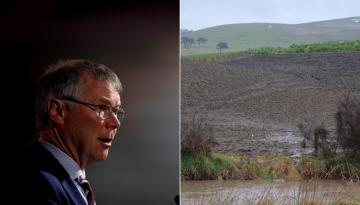
A new report has revealed farmers in the district of Ashburton are set to experience a staggering drop in farm profitability if they are to meet new freshwater guidelines introduced earlier this year.
The Land and Water Management Economic Impact Report, released on Wednesday by the Ashburton District Council, "conservatively" estimated that farm profitability across the district will decline 83 percent - $57.9 million - per year due to the freshwater reforms.
Farm expenditure within the district was also estimated to decline by 23 percent, or $139.9 million, as a result of the new rules.
The National Policy Statement on Freshwater Management has been controversial with farmers since it came into force in September.
The Government says it's necessary to clean up the country's degraded lakes and rivers, but many in the agriculture sector say the new rules are impractical and need to be reworked.
David Clark, president of Federated Farmers' in mid-Canterbury, says the reforms are "unachievable and unworkable" and will have "dramatic impacts" on all parts of the region, and not just with farmers.
"It's bad news for all of mid-Canterbury, urban people included," he told Newshub.
He believed the costs associated with the new legislation would send some farms out of business.
"It will make dairying of the Canterbury Plains incredibly difficult and largely unthinkable," he said.
"What we've got to remember is that those figures are extremely conservative. The actual impact on the district will be much worse."
According to the study there would also be a drop in employment in the district as a result of the lower farm expenditure, with 1233 fewer people estimated to be employed in the agriculture sector.
Ashburton District Mayor Neil Brown said the report showed how "the successful transition to better freshwater outcomes needs to be very carefully balanced with economic sustainability".
"Meaningful change cannot happen overnight. In addition to time, it is critical that our industry and community are supporting innovation and filling gaps in knowledge. This will help our farming practices to evolve so that we can continue producing food and fibre, and minimise the negative unintended economic consequences for our community."
Clark pointed out farmers in the region had already been working towards environmental targets in the Canterbury Land and Water Regional Plan.
He said although that plan was itself ambitious in scope and came with a significant economic impact of its own, it had "at least achievable goals".
"We were on that journey and it would have been far more useful if we'd have been able to continue to make those gains. But it appears that all of that's been thrown in the paper shredder. We've got to start from scratch with a new planning regime, a completely new set of targets."
The Government made a number of tweaks to the new rules shortly after they came into effect and has signalled more changes might be on the way.
However, Clark said it needs a complete overhaul and small changes won't be enough if it is going to be successful.
"They need to start again," he said.


